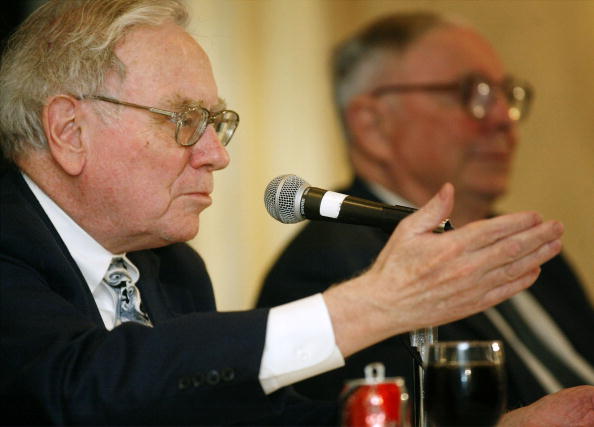Buffett and Munger on Success, Toxicity and Elon Musk
The Berkshire Hathaway CEO, with business partner Charlie Munger, spent hours this weekend discussing life and career choices
The question was a philosophical one: How should you avoid major mistakes in business and life?
Warren Buffett, the 92-year-old chairman and chief executive of Berkshire Hathaway, paused briefly.
“You should write your obituary and then try to figure out how to live up to it,” Mr. Buffett said. “It’s not that complicated.”
At Berkshire’s annual shareholder meeting on Saturday, an event that draws thousands to Omaha, Neb., each spring, Mr. Buffett and his longtime business partner, Charlie Munger, spent hours weighing in on topics as varied as the recent banking turmoil to artificial intelligence and the future of the U.S. As is typical at such gatherings, the executives also doled out plenty of advice on management practices, career choices and how to enjoy a good life.
In prior years, Mr. Munger has heaped scorn on consultants, compensation specialists and what he described as make-work activities inside U.S. companies. This weekend, he directed his ire at wealth managers.
“Having a huge proportion of the young and brilliant people all going into wealth management is a crazy development in terms of its natural consequences for American civilisation,” Mr. Munger said. “We don’t need as many wealth managers as we have.”
He added: “I don’t think a bunch of bankers, all of whom are trying to get rich, leads to good things.”
Mr. Buffett, for his part, said he wanted to see greater accountability inside banks, saying that the recent crisis in the industry illustrated why executives and board members should face consequences if a business encounters problems.
“If the CEO gets the bank in trouble, both the CEO and the directors should suffer,” Mr. Buffett said. “You’ve got to have the penalties hit the people that cause the problems, and if they took risks that they shouldn’t have, it needs to fall on them if you’re going to change how people are going to behave in the future.”
Over hours of questions from investors and others, the two billionaires often peppered their answers with recommendations on how to navigate business. Mr. Buffett advised that people pay attention to how others might try to manipulate them.
He also encouraged those in attendance to resist the temptation to criticise or vilify others.
“I’ve never known anybody that was basically kind that died without friends,” Mr. Buffett said. “And I’ve known plenty of people with money that have died without friends.”
Mr. Munger said that success comes from steering clear of toxic people.
“The great lesson of life is get them the hell out of your life—and do it fast,” Mr. Munger said.
When hiring some of his top leaders over the years, Mr. Buffett said he has tried to suss out someone’s talents and not focus on whether they attended a prestigious institution.
“I have never looked at where anybody went to school in terms of hiring,” Mr. Buffett said. “If somebody mails me a résumé or something, I don’t care where they went to school.”
One of Mr. Buffett’s top lieutenants, Ajit Jain, studied at Harvard Business School, “but he isn’t Ajit because he went to those schools,” Mr. Buffett said.
Mr. Buffett graduated from the University of Nebraska-Lincoln and later studied under the legendary value investor Benjamin Graham at Columbia University. Mr. Munger, who is 99 years old, studied mathematics at the University of Michigan and meteorology at the California Institute of Technology, and went on to earn a law degree from Harvard University.
On artificial intelligence, Mr. Buffett said he had been impressed at generative AI’s abilities to summarise legal opinions and potentially take on other tasks, though he said he also worried about its potential consequences. “It can do all kinds of things, and when something can do all kinds of things, I get a little bit worried because I know we won’t be able to uninvent it,” Mr. Buffett said.
Mr. Munger said he was skeptical of some of the hype around artificial intelligence. “I think old-fashioned intelligence works pretty well,” he said.
Near the end of the meeting, an audience member asked the two billionaires to weigh in on Elon Musk, the SpaceX and Tesla CEO who took control of the social-media platform Twitter last year.
Mr. Buffett called Mr. Musk a “brilliant, brilliant guy,” who had a much different approach in dreaming about the future than the Berkshire executives. Mr. Buffett has often said he takes a hands-off approach to managing Berkshire’s subsidiaries, which range from the insurer Geico to the restaurant chain Dairy Queen. Mr. Musk is known for weighing in on the details at his companies.
“He would not have achieved what he has in life if he hadn’t tried for unreasonably extreme objectives,” Mr. Munger said of Mr. Musk. “He likes taking on the impossible job and doing it. We’re different: Warren and I are looking for the easy job.”
Mr. Buffett said he didn’t want to compete against Mr. Musk, to which Mr. Munger added: “We don’t want that much failure.”
Mr. Musk tweeted Saturday that he appreciated the “kind words from Warren & Charlie.”
 Copyright 2020, Dow Jones & Company, Inc. All Rights Reserved Worldwide. LEARN MORE
Copyright 2020, Dow Jones & Company, Inc. All Rights Reserved Worldwide. LEARN MORE
This stylish family home combines a classic palette and finishes with a flexible floorplan
Just 55 minutes from Sydney, make this your creative getaway located in the majestic Hawkesbury region.
Impact investing is becoming more mainstream as larger, institutional asset owners drive more money into the sector, according to the nonprofit Global Impact Investing Network in New York.
In the GIIN’s State of the Market 2024 report, published late last month, researchers found that assets allocated to impact-investing strategies by repeat survey responders grew by a compound annual growth rate (CAGR) of 14% over the last five years.
These 71 responders to both the 2019 and 2024 surveys saw their total impact assets under management grow to US$249 billion this year from US$129 billion five years ago.
Medium- and large-size investors were largely responsible for the strong impact returns: Medium-size investors posted a median CAGR of 11% a year over the five-year period, and large-size investors posted a median CAGR of 14% a year.
Interestingly, the CAGR of assets held by small investors dropped by a median of 14% a year.
“When we drill down behind the compound annual growth of the assets that are being allocated to impact investing, it’s largely those larger investors that are actually driving it,” says Dean Hand, the GIIN’s chief research officer.
Overall, the GIIN surveyed 305 investors with a combined US$490 billion under management from 39 countries. Nearly three-quarters of the responders were investment managers, while 10% were foundations, and 3% were family offices. Development finance institutions, institutional asset owners, and companies represented most of the rest.
The majority of impact strategies are executed through private-equity, but public debt and equity have been the fastest-growing asset classes over the past five years, the report said. Public debt is growing at a CAGR of 32%, and public equity is growing at a CAGR of 19%. That compares to a CAGR of 17% for private equity and 7% for private debt.
According to the GIIN, the rise in public impact assets is being driven by larger investors, likely institutions.
Private equity has traditionally served as an ideal way to execute impact strategies, as it allows investors to select vehicles specifically designed to create a positive social or environmental impact by, for example, providing loans to smallholder farmers in Africa or by supporting fledging renewable energy technologies.
Future Returns: Preqin expects managers to rely on family offices, private banks, and individual investors for growth in the next six years
But today, institutional investors are looking across their portfolios—encompassing both private and public assets—to achieve their impact goals.
“Institutional asset owners are saying, ‘In the interests of our ultimate beneficiaries, we probably need to start driving these strategies across our assets,’” Hand says. Instead of carving out a dedicated impact strategy, these investors are taking “a holistic portfolio approach.”
An institutional manager may want to address issues such as climate change, healthcare costs, and local economic growth so it can support a better quality of life for its beneficiaries.
To achieve these goals, the manager could invest across a range of private debt, private equity, and real estate.
But the public markets offer opportunities, too. Using public debt, a manager could, for example, invest in green bonds, regional bank bonds, or healthcare social bonds. In public equity, it could invest in green-power storage technologies, minority-focused real-estate trusts, and in pharmaceutical and medical-care company stocks with the aim of influencing them to lower the costs of care, according to an example the GIIN lays out in a separate report on institutional strategies.
Influencing companies to act in the best interests of society and the environment is increasingly being done through such shareholder advocacy, either directly through ownership in individual stocks or through fund vehicles.
“They’re trying to move their portfolio companies to actually solving some of the challenges that exist,” Hand says.
Although the rate of growth in public strategies for impact is brisk, among survey respondents investments in public debt totaled only 12% of assets and just 7% in public equity. Private equity, however, grabs 43% of these investors’ assets.
Within private equity, Hand also discerns more evidence of maturity in the impact sector. That’s because more impact-oriented asset owners invest in mature and growth-stage companies, which are favored by larger asset owners that have more substantial assets to put to work.
The GIIN State of the Market report also found that impact asset owners are largely happy with both the financial performance and impact results of their holdings.
About three-quarters of those surveyed were seeking risk-adjusted, market-rate returns, although foundations were an exception as 68% sought below-market returns, the report said. Overall, 86% reported their investments were performing in line or above their expectations—even when their targets were not met—and 90% said the same for their impact returns.
Private-equity posted the strongest results, returning 17% on average, although that was less than the 19% targeted return. By contrast, public equity returned 11%, above a 10% target.
The fact some asset classes over performed and others underperformed, shows that “normal economic forces are at play in the market,” Hand says.
Although investors are satisfied with their impact performance, they are still dealing with a fragmented approach for measuring it, the report said. “Despite this, over two-thirds of investors are incorporating impact criteria into their investment governance documents, signalling a significant shift toward formalising impact considerations in decision-making processes,” it said.
Also, more investors are getting third-party verification of their results, which strengthens their accountability in the market.
“The satisfaction with performance is nice to see,” Hand says. “But we do need to see more about what’s happening in terms of investors being able to actually track both the impact performance in real terms as well as the financial performance in real terms.”
This stylish family home combines a classic palette and finishes with a flexible floorplan
Just 55 minutes from Sydney, make this your creative getaway located in the majestic Hawkesbury region.






















